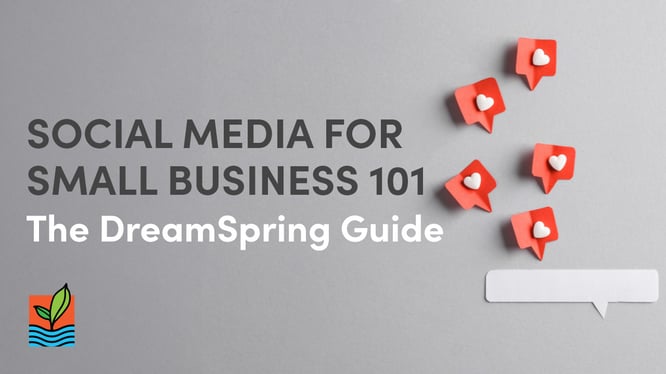Don’t let social media take a backseat to the daily operations of your small business. Follow the guide below to enhance your social media strategy, connect with customers, and build community around your small business.

In today’s digital-first marketplace, having a strong social media strategy can set you apart from peers. Think about what happens when you try a new restaurant: You look them up on social media to learn more about their menu, see if the food looks attractive, and maybe confirm their hours of operation or address. You might even use social media to find a phone number and make a reservation — all without ever looking at the business’s website. Social media platforms are powerful tools for building brand awareness, engaging with your customers, and driving sales.
|
For many small business owners, especially sole proprietors, social media often takes a back seat to the day-to-day operations. But having a presence and building a social media strategy can have a high return on investment when it comes to sales, revenue, and new customer acquisition. |
|
Social Media for Small Business 101 Quick Links |
|
What Can Social Media Do for Your Small Business?

|
Build Brand AwarenessSocial media provides a platform to showcase your brand's personality, values, and offerings. Consistent and engaging content helps establish brand recognition, making your business more memorable to your target audience. Social media is often more user-friendly than your website, so you can connect with your customers more often with more engaging media (like photos, videos, and your business in action!). |
|
Engage with Your AudienceSocial media platforms offer direct and real-time interaction with your network. Engaging with comments, messages, and user-generated content builds a sense of community and strengthens customer relationships. It also provides you with a chance to see where your small business can do better. Get a bad review? You have a chance to provide a response and speak to that customer in a way that improves your reputation and connects with customers with similar concerns. |
|
Drive Website TrafficA well-crafted social media strategy can drive traffic to your website, increasing the chances of converting visitors into customers. Share compelling content and incorporate calls to action to guide users to your website. Even something as simple as saying “learn more at mywebsite.com” gives viewers a next step. If they’re curious and interested, you want to keep their attention. |
|
Generate Leads and SalesSocial media is a powerful tool for lead generation and sales. Implement strategies such as social media advertising, exclusive promotions, and influencer partnerships to convert social media engagement into tangible business outcomes. |
How to Develop an Effective Social Media Strategy

Define Your Goals:
Clearly articulate your social media objectives. Whether it's increasing brand awareness, driving website traffic, generating leads, or boosting sales, having specific goals will guide your strategy and help measure success.
Know Your Audience:
Understand your target audience's preferences, behaviors, and demographics. Tailor your content to resonate with your audience, and use analytics tools to gain insights into their engagement patterns.
Choose the Right Platforms:
Not all social media platforms are created equal. Identify platforms where your target audience is most active. Facebook, Instagram, Twitter, LinkedIn, and TikTok each cater to different demographics and content styles.
Craft Compelling Content:
Develop a content strategy that aligns with your brand voice and resonates with your audience. Include a mix of visuals, videos, and written content to keep your feed diverse and engaging.
Post Consistently:
Consistent posting is crucial for maintaining audience engagement. Develop a posting schedule and adhere to it. Use scheduling tools to plan and automate posts, ensuring a steady flow of content.
Leverage Visual Content:
Visual content, such as images and videos, tends to perform exceptionally well on social media. Invest in high-quality visuals that showcase your products, services, and brand aesthetics.
Engage Authentically:
Authenticity builds trust with your audience. Respond to comments, messages, and user-generated content genuinely. Humanize your brand by showcasing behind-the-scenes moments and the people behind the business.
Invest in Paid Advertising:
Social media advertising can significantly amplify your reach. Platforms like Facebook and Instagram offer targeted advertising options, allowing you to reach specific demographics based on interests, behaviors, and demographics.
Collaborate with Influencers:
Influencer marketing can be a powerful strategy to tap into established audiences. Identify influencers relevant to your industry or niche and collaborate on campaigns that align with your brand.
Monitor Analytics:
Regularly analyze social media analytics to measure the performance of your content and campaigns. Metrics such as engagement, reach, and conversion rates provide valuable insights for refining your strategy.
Adapt and Evolve:
Social media trends and algorithms are constantly evolving. Stay informed about industry changes, experiment with new features, and be ready to adapt your strategy to stay relevant.
General Overview of Social Media Platforms


|
Ideal for building brand communities, sharing diverse content types, and utilizing targeted advertising options. |

|
Visual-centric platform suitable for businesses with visually appealing products or services. Ideal for storytelling through images and short videos. |
|
X (formerly Twitter)Best for real-time updates, engagement, and building brand personality through concise and impactful messaging. |

|
Professional platform ideal for B2B businesses, networking, and establishing thought leadership in your industry. |

|
TikTokThrives on creative and entertaining short-form videos. Ideal for businesses targeting a younger, trend-savvy audience. |
Things to Consider
 You’ll want to familiarize yourself with data privacy regulations and ensure compliance when collecting and utilizing user data. Be transparent in your communication and ensure that your content aligns with your brand values. Authenticity builds trust with your audience.
You’ll want to familiarize yourself with data privacy regulations and ensure compliance when collecting and utilizing user data. Be transparent in your communication and ensure that your content aligns with your brand values. Authenticity builds trust with your audience.
Many platforms have unique guidelines on the type and format of content that can be posted. Adhere to the community guidelines of each platform to avoid penalties and account suspension. Familiarize yourself with specific rules regarding promotions, contests, and sponsored content. Ensure that your content is accessible to all users, including those with disabilities. Use alt text for images and make your content inclusive.
|
Authenticity builds trust with your audience. |
Social Media Summary
 Like riding a bicycle, social media can seem daunting at first, but once you learn how, you build muscle memory. Even if you don’t post regularly, having a presence on social media channels lends credibility to your small business and keeps someone from creating a channel with your business name. You don’t want to be “YourBusiness2” because someone created an account first.
Like riding a bicycle, social media can seem daunting at first, but once you learn how, you build muscle memory. Even if you don’t post regularly, having a presence on social media channels lends credibility to your small business and keeps someone from creating a channel with your business name. You don’t want to be “YourBusiness2” because someone created an account first.
Think of social media as a community, or as an extension of your small business website — a way to share information with customers. Each platform is a tool for your business, and if used well, can contribute to your sales and revenue goals!
More Business Resource Articles

